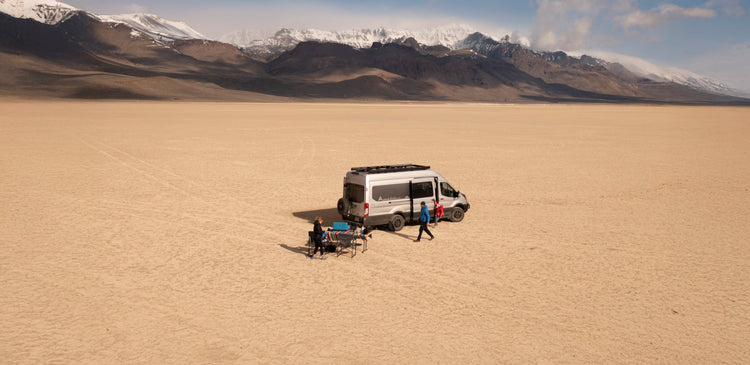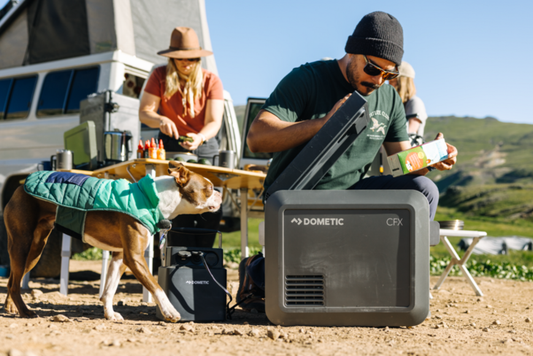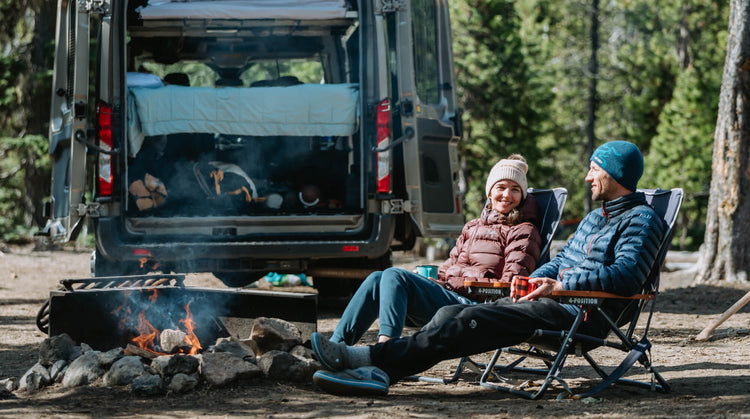Dreaming of the open road, starry skies, and total freedom from the grid? Living off-grid in your camper van means more adventure, fewer hookups—and definitely fewer worries about finding an outlet. But here’s the kicker: you don’t need a giant, wallet-draining battery bank to make it happen.
Too many van lifers overbuild their electrical systems, thinking “bigger is better.” The truth? With a little know-how and smart planning, you can power your adventures with a compact, efficient setup that won’t break the bank—or weigh down your build.
This guide will show you exactly how to calculate your camper van power needs, explore common van electrical setups, and introduce a cost-effective off-grid power system that actually makes sense.

Section 1: You Don’t Need a Huge Battery Bank—Here’s Why
Before you shell out for a monster battery setup, take a step back. Most van lifers don’t need nearly as much power as they think. Let’s break it down:
Step 1: List Your Electrical Devices
Start with a basic gear inventory. Common camper van electrical components include:
-
LED lights
-
12V fridge
-
Two Ventilation fans
-
Laptop
-
USB phone chargers
Step 2: Calculate Daily Power Usage (Watt-Hours)
Find the power consumption (watt-hours) for each device, either from appliance labels, user manuals, or a quick Google search. Multiply the power draw by the number of hours you expect to use each device per day.
Example: A fridge drawing 50W and running 24 hours = 1,200Wh/day
Step 3: Convert to Amp-Hours (Ah)
Most camper van batteries are 12V, so use this formula:
Watt-Hours ÷ 12 = Amp-Hours
Example: 1200Wh ÷ 12V = 100Ah
Step 4: Understand Battery Types & Efficiency
Not all batteries are created equal:
-
Lead-Acid Batteries: Only about 50% usable. A 100Ah battery gives you 50Ah of actual power.
-
Lithium Batteries: Much better—up to 100% usable. Lighter, longer-lasting, and perfect for van life.
Pro Tip: Avoid overbuilding. Right-sizing your battery bank saves money, weight, and space.

Section 2: What a Typical Van Build Really Uses
Let’s look at a real-world example of camper van power usage:
Basic Van Electrical Setup:
-
Fridge (Dometic CFX5 75DZ): 1.29Ah/hr → 31Ah/day
-
Vent Fan (MaxxAir 7500K on Medium): 2.5Ah/hr → 60Ah/day
-
6 LED Lights (5 hours/night): 18W total → 7.5Ah/day
-
Phone Charging + Laptop Use: ~5–10Ah/day
Don’t Forget Solar Panels
Solar power for camper vans is one of the easiest ways to keep your battery charged while living off-grid. Whether you are boondocking in the desert or camping under cloudy skies, solar helps you stay powered up.
How Much Solar Do You Really Need?
It depends on:
-
Your total daily energy use (Ah or Wh)
-
Average sun hours in your region
-
Efficiency of your solar panel and charge controller
Example: A 200W solar panel setup can generate around 800Wh/day (or 66Ah)—enough to keep your batteries well-charged during the day; especially if you’re just running the fridge and fan while you’re out adventuring.
But, if you think you need a little more juice, no problem. Just slap a second panel on the roof and double your solar charging capability.
Our Go-To Solar Panel: Renogy 200W ShadowFlux
If you want reliable solar performance, check this out:
-
Up to 25% Efficiency
-
N-Type Solar Cells = better performance in heat and less degradation over time
-
Anti-Shading Technology = keeps charging even when partially blocked
-
Perfect for Off-Grid Travel with unpredictable weather
Pro Tip: Pair this panel with a smart MPPT charge controller and you’ll be cruising with clean energy all day.
Running a Rooftop Air Conditioner Off-Grid? You’ll Need More Power
Thinking about adding a rooftop A/C unit like the Dometic RTX2000? It’s totally possible—but you’ll need serious battery capacity.
Power Use for Dometic RTX2000:
-
Eco Mode: 19Ah/hr
-
8 hours overnight = 152Ah
-
Add your normal daily consumption: ~250Ah/day
Want 2 days of runtime without recharging? You’ll need 500Ah of usable battery—this is a large system best suited for full-time vanlifers or those in extreme climates.
Section 3: The Base 12V Electrical System – A Smart, Off-Grid Power Solution
Looking for a power system that’s simple, affordable, and road-ready? The Base 12V Electrical System from Adventure Wagon is your sweet spot.
Why We Recommend It:
-
200Ah of Lithium Battery Capacity: More than enough for lights, fridge, fan, and device charging
-
DIY-Friendly Design: Simple to install and easy to maintain
-
Optimized for Solar & Alternator Charging
-
Reliable Off-Grid Performance: No unnecessary complexity or bulk
-
Available for both the Mercedes Sprinter 144 and Ford Transit
Whether you're weekend camping or full-time on the road, the Base 12V System gives you the power you need without going overboard.
You don’t need a massive battery bank or complicated electrical system to enjoy life off the grid. By calculating your real power needs and choosing smart components—like efficient solar panels for vans and a reliable 12V electrical system—you’ll have the freedom to roam without the headaches.
Want a no-fuss system?
Want to keep weight, cost, and complexity down?
Want to power your van with confidence?
Go with a well-designed off-grid setup like the Base 12V Electrical System—and get back to doing what van life is all about: exploring.





